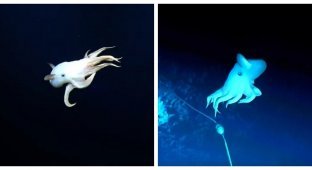Blanket octopus: 2 meters of living “sheet” sends predators into a stupor (11 photos)
The blanket octopus is perhaps one of the strangest animals I have ever heard of. They can really provide shelter: the size of the cephalopod is enough for a double bed. But we don’t recommend snuggling with an octopus blanket if you have a girlfriend or wife. 
Only females grow to the size of a sleeping set - what if your significant other gets jealous? 
Oh, the author of the article has new wallpaper for his desktop.
The length of female blankets reaches 2 meters - this is a decent result for octopuses. Can you imagine how big the males are? I bet you don't. Because you most likely won’t even notice the cephalopod gentlemen in the water column. Males are 40,000 times lighter than females, and their length is at most 2.5 centimeters! But who in their right mind would need such a radical difference in size? 
The blanket has run away, the sheet is floating away.
As always in nature, this feature has its own logic, you just need to dig a little. The blanket octopus is noticeably different from its multi-armed comrades in lifestyle. He does not sit out in coral reefs, does not hide in secluded creeks and caves. The mollusk travels through the tropical and subtropical waters of the planet. This is a bold decision for an octopus, because in the open sea its ability to camouflage is useless. 
The rainbow blanket octopus looks like it's the ghost of a long-dead octopus.
To survive in public view, the males began to shrink in size. Large predators won't find you if your carcass is no bigger than a piece of seaweed. Even scientists discovered guys only in 2004, a century and a half after the discovery of females. And against sizeable opponents, the octopus uses an old but reliable remedy: spitting ink directly into the eyes. 
Males are so small that they remain translucent throughout their lives!
If this is not enough, the male will whip the enemy with poisonous tentacles! The blanket octopus has developed immunity against the stinging tentacles of Portuguese man-of-war, relatives of jellyfish. In case of danger, the cephalopod hides in thickets of toxic shoots. But if the baby octopus doesn’t want to sit on the barricades for days on end, he tears off one of the tentacles and swims about his business! After amputation, the former body part of the Portuguese man-of-war is capable of poisoning others for several more days. 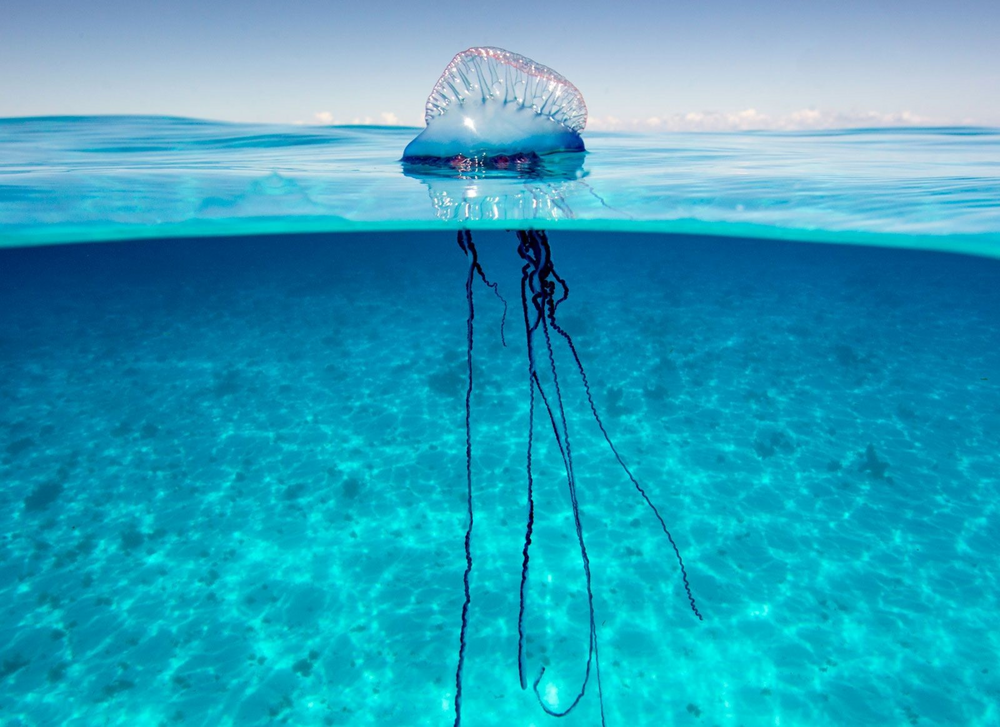
And here comes the Portuguese man-of-war - our octopus’s best friend.
In general, the males settled in well. But the females had a more difficult time, because they were not able to shrink. The smaller the female, the fewer eggs she can lay, which has a bad effect on the rate of growth and recovery of the population. And the mortality rate of octopuses in the initial stages of life is very high. 
Young and small females also do not hesitate to use the tentacles of the boats. But the larger the enemy, the lower the effectiveness of the weapon.
Therefore, octopuses began to evolve in exactly the opposite direction - towards increasing size! And both obvious and fake. The ladies thought of throwing a thin leather veil over themselves and stretching it between the 4 rear tentacles. The membrane turned out to be so large that a person could actually wrap himself in it! 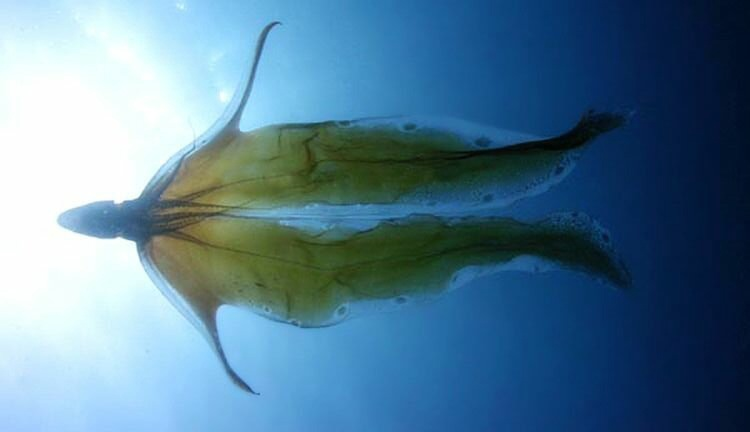
Rapunzel from the world of octopuses!
In everyday life, such a bedspread is completely useless. But when meeting a predator, the female turns her tentacles towards the enemy. He sees not a weak octopus, but a huge animal of incomprehensible shape. Most predators are afraid to get involved with the unknown, especially if it is gigantic in size. And even if he decides to bite the victim, he will simply cling to the blanket. A piece of coating will remain in the attacker's mouth, and the female will be able to escape after releasing a cloud of ink. 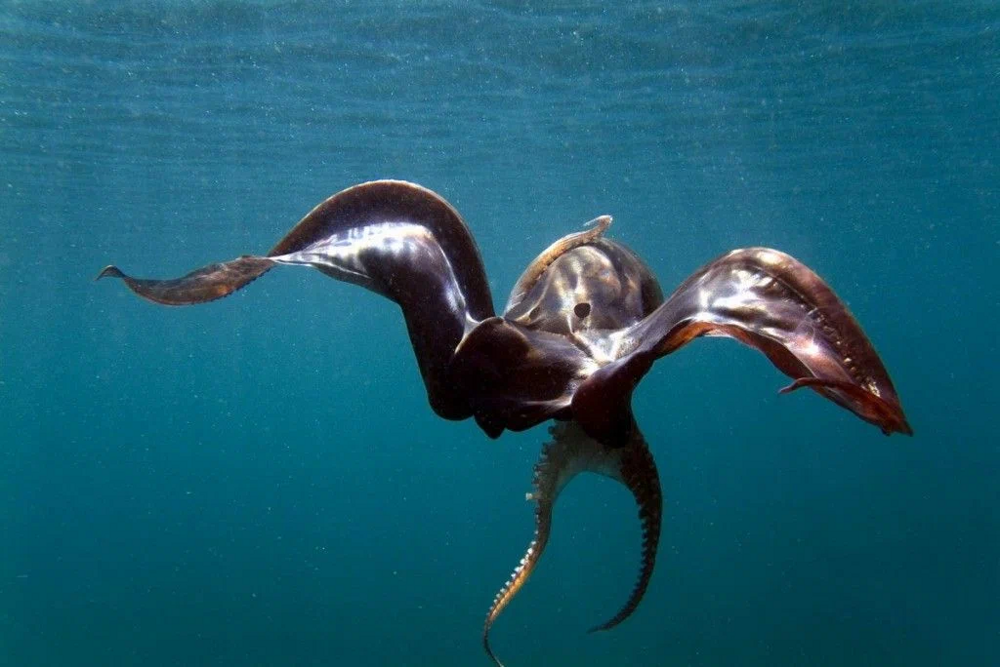
Come on, attack! I am the very embodiment of chthonic horror!
And then she will go on a date with the males. That's right, in many waysnumber. Her hands and heart are in high demand. But only the luckiest will get what they want. And he will die. His competitors, by the way, will die too. It's all about the peculiarities of the male reproductive system. Death and reproduction are synonymous concepts for them. 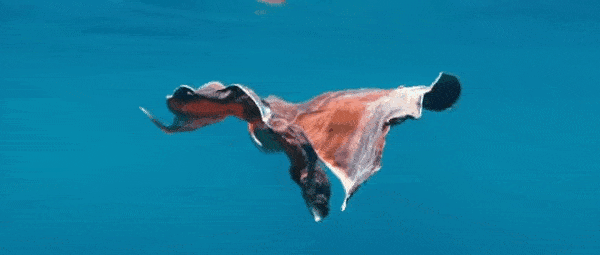
Don't throw plastic bags into the sea. Currents carry them for decades!
The third right tentacle of the male is transformed into a hectacotyl, a special sexual organ that delivers sperm to its destination. To demonstrate his affection to the lady, the male tears off the hectacotyl from himself and sends it to the female, after which he quickly dies. 
The large white tentacle is a hectacotylus. I would also die if half of my body was torn off.
For some time she keeps the reproductive tentacles under her mantle. And then he chooses one of them and arranges for himself to mate. The lucky one will become the father of more than 100,000 octopuses. True, the title of father of many children will have to be awarded posthumously.















